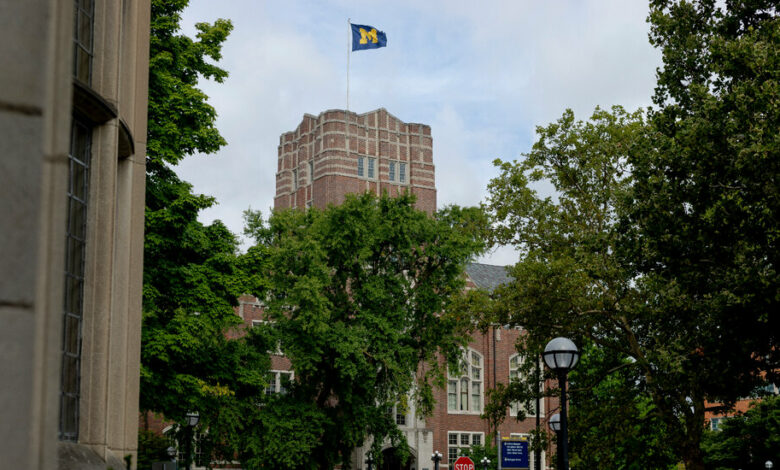In Michigan, activists take over and shut down the student council

Students were prepared for a stalemate. There was an Ultimate Frisbee team with no money to compete, an airport shuttle that nearly doubled its cost to students without campus funding, and a ballroom dance team that couldn’t rent rehearsal space.
At the University of Michigan, many student activities are funded or subsidized by the Central Student Government, better known as CSG. This elected body of undergraduates and graduates decides how to distribute approximately $1.3 million annually to some 400 groups.
But last spring, pro-Palestinian activists operating under the Shut It Down party won control of the student council and immediately moved to withhold funding for all activities until the university promised to divest from companies that profit from Israel’s war in Gaza.
However, university administrators have consistently said that divestment is off the tableAnd when students returned to school, the campus seemed to come to a virtual standstill.
“It’s incredibly stressful,” said Nicolette Kleinhoffer, president of the ballroom dance team. The team relies on the student council for most of its funding, which covers competitions, a coach, and rehearsal and performance space.
The student council takeover was a new strategy for pro-Palestinian activists, who took on the Michigan government as it dismantled camps and disciplined demonstrators.
But as the school year resumed, some wondered whether the closure would provoke a negative reaction and what the university would do.
The student council’s budget comes not from the university’s endowment, but from tuition — $11.19 per student per semester. Last year, that money subsidized access to fitness classes, newspaper subscriptions and an airport shuttle. The student council sponsored a welcome event for the university’s gender and sexuality center, as well as iftars — the daily sunset meal eaten to break the fast during Ramadan — for more than 300 participants.
“I think it’s a little silly to refuse to give out money that comes from students to help students,” said Gabriel Scheck, a senior and president and captain of the men’s Ultimate Frisbee team, which receives up to a third of its annual budget from the student council.
The team is one of the few club sports without membership fees. But without funding, players would have to pay dues and other costs, such as travel, which Mr. Scheck said would raise the barrier to entry.
When the Shut It Down Party campaigned for student government, it made no secret of its intentions. Its platform “had a single goal: to shut down the University of Michigan Central Student Government,” Alifa Chowdhury, the party’s president, wrote in a statement to The Times. Other members of the group declined to comment.
In the March elections, in which less than 20 percent of students voted, Shut It Down won the presidency and vice presidency and captured 22 of the 45 seats in the assembly.
After the elections, the new leaders of the student council have a solutionin which the university’s governors were called upon to divest. In May, Ms. Chowdhury gave a proposition condemns the university’s decision to call in the police to break up the protest camps.
Since then, however, there has been almost no silence from student leaders. Some members of the assembly said they have not officially heard from Ms. Chowdhury since June, after she vetoed a proposed budget for the spring and summer. (Ms. Chowdhury said she also sent an explanatory memo with the decision.) In July, an attempt to override her veto failed by one vote.
Several of the nearly two dozen groups that supported Shut It Down also faced losing their funding, including Students Organize for Syria, the Muslim Students Association, and United Students Against Sweatshops.
Ali Allam, co-chair of the Muslim Coalition and the Islamophobia Working Group, is not a member of the Shut It Down party, but he said he agrees with its mandate for change.
“This is a student movement that has been protesting for over 20 years, long before October,” with little success, he said. “It seems like all options have been exhausted and when that happens, there is only so much you can do as a student movement.”
The support extended beyond like-minded political groups. Sarah Shaw-Nichols, a junior and the president of the university’s stand-up comedy club, wanted to start a late-night talk show.
Even though her project was threatened, “the sacrifice is worth it,” she said.
“Something had to change,” Ms. Shaw-Nichols said of the university’s investments.
However, some see the funding freeze and protest camps as pointless, trying to influence an international issue at the expense of students, especially those who are financially broke.
“There are people, and I’ve spoken to one or two, who walked past that camp and were worried about where they were going to get their next meal,” said Gabriel Ervin, who unsuccessfully ran for student body president on a platform that prioritized workers’ rights.
What those students saw, he said, was “all the so-called labor-oriented and left-wing organizations on campus devoting all their resources to a war they had no control over.”
Last week, there was a temporary solution. At the request of several members of the student body, the university board agreed to temporarily fund organizations on the condition that it would be fully reimbursed, said Colleen Mastony, a spokeswoman for the university.
Some students cheered the move. “It’s critical that the university upholds its rules, that the university upholds its standards,” said Evan Cohen, a senior and president of Wolverine for Israel, which supports Israel and its ties to the U.S.
Others saw something paradoxical in the outcome, wondering whether student council leaders had inadvertently given up more power.
“They traded the opportunity to have students give money for money that the administration gives,” said Tyler Watt, a law student who serves on the student council but not as a member of Shut It Down.
Ms Chowdhury urged her colleagues not to give in and reject the government’s financial offer.
“This is an attempt to appease the student population while refusing to engage with the substance of the protest,” she said in a statement. “We call on all organizations to boycott this funding and continue to push the administration to divest.”




